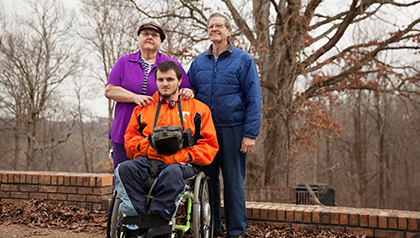AARP Hearing Center

When their son Coleman was left paralyzed in an auto accident three years ago, Judy and Denver Collins vowed they would do whatever it took to care for him. But taking him to doctors’ appointments, helping him get around and keeping him healthy has proved costly.
They found that insurance doesn’t always pay for medical equipment their son desperately needs.
That’s why the Palmyra couple are grateful they’ve been able to get donated wheelchairs and a specialized mattress for their son.
“That helped a lot,” Denver Collins said of the mattress. Without it, he would have to turn Coleman every couple of hours to prevent bedsores.
“I’m 67, so that’s a little onerous,” Collins said of the prospect of tending to his son so frequently.
Coleman, now 24, and his parents have benefited from a program at United Cerebral Palsy (UCP) of Middle Tennessee in Nashville that helps people like them find used durable medical equipment.
There’s an enormous demand for wheelchairs, bath chairs, walkers, canes and other such items.
“We all desperately need equipment,” said Lois Symington, executive director of the East Tennessee Technology Access Center (ETTAC) in Knoxville. “We can’t get it in fast enough.”
ETTAC is part of a network of five centers across Tennessee that help people with disabilities. The centers lend equipment—including computers and hospital beds—on a short-term or long-term basis at no cost.
The program is especially valuable to low-income older people and people on fixed incomes. Medicare often won’t pay for medical equipment, or the copays are too expensive. Even the cost of a bath chair can be out of reach for some, Symington said.
Help for caregivers
The loaned equipment can be a big help to a caregiver. That’s why AARP Tennessee is trying to get the word out about the exchanges.
“One of our big priorities this year is caregiving, and we want to raise awareness about the resources that are available in the community,” said Tara Shaver, AARP Tennessee interim communications director.
Denver and Judy Collins know how valuable the equipment is, so they both volunteer at UCP of Middle Tennessee. They clean equipment, sometimes repair it, and transport it to people who need it.
Judy Collins recalled bringing a power chair to a man at their church who had difficulty walking.
“You would have thought I had given him the world’s greatest gift,” Collins said.
There is no cost for the equipment, but UCP asks for a donation, if people can afford it, and that the equipment be returned when it’s no longer needed. UCP serves people with all sorts of disabilities, not just cerebral palsy, said Margaret Eighmy, director of the agency’s exchange program.
Chattanooga Goodwill Industries has an award-winning equipment exchange program that serves 23 counties in southeast Tennessee and northern Georgia.
It lends equipment to anyone with a disability or injury, but prescriptions are required for getting a wheelchair or motorized chair, said Kimberly Warren, director of community services at Chattanooga Goodwill. There is no fee for the equipment, but Goodwill asks that people return items they are no longer using so that someone else can benefit.
Goodwill, UCP and ETTAC all accept donated equipment.
Sheila Burke is a writer living in Nashville.































































